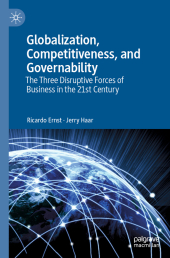 Neuerscheinungen 2019Stand: 2020-02-01 |
Schnellsuche
ISBN/Stichwort/Autor
|
Herderstraße 10
10625 Berlin
Tel.: 030 315 714 16
Fax 030 315 714 14
info@buchspektrum.de |

Ricardo Ernst, Jerry Haar
(Beteiligte)
Globalization, Competitiveness, and Governability
The Three Disruptive Forces of Business in the 21st Century
1st ed. 2019. 2019. xxi, 184 S. 6 SW-Abb., 18 Farbabb. 235 mm
Verlag/Jahr: SPRINGER, BERLIN; SPRINGER INTERNATIONAL PUBLISHING 2019
ISBN: 3-03-017515-4 (3030175154)
Neue ISBN: 978-3-03-017515-3 (9783030175153)
Preis und Lieferzeit: Bitte klicken
This book argues that three powerful symbiotic forces (globalization, competitiveness, and governability) are disrupting business in the 21 st century, resulting in an impact on the economic and business environment far greater than the effects of any of these three individually. Both globalization and competitiveness are governed essentially by market forces that force the introduction of significant changes aimed at increasing efficiency so that a better use may be made of the advantages of globalization (i.e., the traditional "invisible" hand). Responsibility for bringing about these changes lies not only with the private sector but also with the government (i.e., the "visible" hand).
Readers will find in this book an explanation of how globalization, competitiveness, and governability define the context of global business.
CHAPTER 1 WHY THE THREE FORCES
1.1 Globalization and Competitiveness
1.2 Globalization and Governability
1.3 Competitiveness and Governability
1.4 Some Interesting "visible hand" Examples
1.5 The Synergy between Globalization, Competitiveness and Governability
CHAPTER 2 GLOBALIZATION
2.1 A Brief History
2.2 The 21st century - An Era of Digital Globalization
2.3 Features of Globalization
2.4 Multinational Corporations and Non-Governmental Organizations (NGOs)
2.5 Risks and Opportunities with Globalization
2.6 Multinational Corporations and Globalization
2.7 Branding in the Era of Globalization
2.8 Glocalization
2.9 Measuring Globalization
2.10 Challenges and Reflection
CHAPTER 3 COMPETITIVENESS
3.1 A Definition and Understanding of Competitiveness
3.2 Measuring Competitiveness
3.3 Advantages and Disadvantages of Competitiveness
3.4 Direct Link between Competitiveness and Governability
3.5 The Four Primary Drivers of Competitiveness
3.6 Challenges and Reflection
CHAPTER 4 GOVERNABILITY
4.1 A Brief History
4.2 Direct Link between Governability and Globalization
4.3 A Conceptual Basis of Governability
4.4 Measuring Governability
4.5 Governance versus Government
4.6 Corruption
4.7 The Power of Good or Transformative Governance
4.8 Regulatory Bodies
4.9 Challenges and Reflection
CHAPTER 5 THE TECHNOLOGY JUGGERNAUT
5.1 Brief History
5.2 The 21st century - An Era of Digital Globalization (20th/21st Century)
5.3 Disruptive Technologies of Future
5.4 Technology and Globalization
5.5 Technology and Competitiveness
5.6 Technology and Governability
5.7 A Major Transformation in Interconnectivity
5.8 Technology´s Future
CHAPTER 6 SUPPLY CHAINS
6.1 Connecting It All Through Supply Chain Management
6.2 The Challenge of Global Supply Chains
6.3 SCM and Globalization
6.4 SCM and Competitiveness
6.5 SCM and Governability
6.6 Companies with Supply Chain in Focus
CHAPTER 7 FINANCIAL SERVICES
7.1 FinTechs - The Future of Global Banking
7.2 Financial Services and Globalization
7.3 Financial Services and Competitiveness
7.4 Financial Services and Governability
7.5 The Next Revolution in Financial Services - Blockchain
CHAPTER 8 CONCLUSIONS
CHAPTER 9 SUGGESTED ADDITIONAL READING FROM THE GCG JOURNAL
Ricardo Ernst is the Baratta Chair in Global Business and Professor of Operations and Global Logistics, Managing Director of the Global Business Initiative, Managing Director of the Latin American Board and former Deputy Dean, all at the McDonough School of Business, Georgetown University, USA. He is co-author of Innovation in Emerging Markets and Global Operations and Logistics.
Jerry Haar is a professor of international business and director of Executive & Professional Education in the College of Business at Florida International University, USA. He is also a Global Fellow of the Woodrow Wilson International Center for Scholars and a senior research fellow at Georgetown´s McDonough School of Business. He is the author/editor of 17 books, including The Future of Entrepreneurship in Latin America and Innovation in Emerging Markets.


